#aasa lydia
Photo
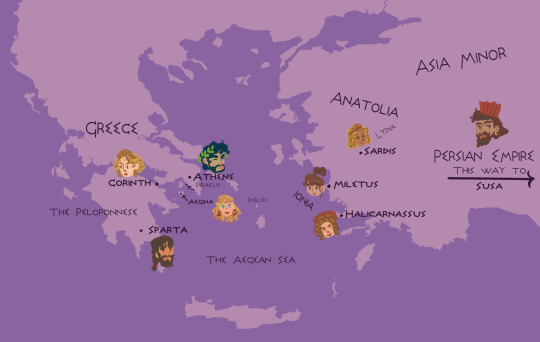
Welcome to Athens and Sparta Adventures!
[ Chapter 1 ] [ table of contents ] [ recap ] [ Chapter 8 ]
Reference map for Chapter 8 of Athens and Sparta Adventures. Characters may be added as they appear or are mentioned in the chapter.
It’s not exactly clear what the borders between Greek territory in Ionia and the Persian Empire begin or end (especially since I only have a loose date in the 440s BCE for the chapter), but theoretically Ionia is under Athenian control. Sardis remains firmly in the Persian Empire while Halicarnassus may still be part of Persia or may have joined the Delian League, it’s not entirely clear. The Persian Royal Road extends from Sardis to Susa.
Most of the action in this chapter takes place in Miletus and at the Piraeus harbour near Athens.
New Readers: please note that this comic is not mobile friendly. Some directory links such as the table of contents only work on desktop, mobile users should still be able to navigate using the bolded links above. I started writing this comic back in 2011 and reuploaded it to tumblr around 2018, which is why there’s significant gaps in both my consistency as a creator and in the changes in usability on this hellsite.
See below for brief Character Bios
Characters of Note
MAJOR CHARACTERS
Athens - The arrogant, egotistical and hubristic almost-capital of Greece. Athens’ more legitimate claims to hegemony are primarily his large navy and alliance of islands and city-states throughout Greece that purports to defend Greece from future Persian incursions. Although he is entering what we know as the “Golden Age” while the Parthenon and other such major renovations are nearing completion, Athens seems somewhat preoccupied with his vacation...
Sparta - Known as Greece’s greatest warrior despite rarely finding reason to leave home on time, Sparta is uneasily resting after emerging somewhat victorious from the First Peloponnesian War. Although accepting a thirty year period of peace with rival Athens, Sparta finds the upstart city-state’s obsession with ‘democracy’ and the growing excuses to coerce new alliances increasingly worrisome.
Corinth - The rich merchant city-state of Corinth has a vested interest in decreasing Athens’ power. Despite recently recovering her daughter-city of Megara, Corinth still finds others’ loyalties to her being tested. Frustrated by Sparta’s unwillingness to act on her warnings, Corinth suspects that a thirty years peace will do even less to stave off war in Greece.
Miletus (Ionia) - Athens’ niece, recently recovered from Persia’s possession after nearly a century after the Peace of Callias. Having spent some time living with her uncle again, Miletus is concerned that Athens’ execution of power are more and more resembling the systems employed by Persia. Having seen her former despot in her city despite the agreement that Persia should stay three days ride from the coast, Miletus has decided to confront him...
Persia - Currently the greatest power in Asia with territory stretching from Egypt to India, Persia has tentatively given up a direct assault on mainland Greece after wasting a lot of time and resources that seems to have accidentally united the disparate city-states against him. Instead, Persia has taken a back seat in his political interference, now preferring words and funds as weapons of choice.
MINOR CHARACTERS
Sardis - A wealthy city-state in Asia Minor, formerly the capital of the kingdom of Lydia which was conquered by Persia’s first king Cyrus over a century prior. Now, Sardis is the administrative centre for that region of the empire and the terminus of the Persian Royal Road from Susa. Despite this, Sardis demonstrates some concern for his rival-turned-friend Miletus in the decade after her exit from the empire.
Halicarnassus - the hometown of the so called “Father of History” (currently abroad in Athens) and also one of Miletus’ colleagues under Persian rule. Halicarnassus’ current allegiances appear to be a mixed bag, having helped lead an attack on Athens at the Battle of Salamis on behalf of Persia.
Laconia - Sparta’s wife, representing the surrounding territory and specifically the Perioikoi employed to support the elite class of Spartiate warriors. Laconia is concerned about Sparta’s frequent trips from home into enemy territory as the polis (or the five villages in a trenchcoat. chlamys?) has no walls to defend itself from attack. On top of a recent earthquake and uprising of the enslaved Helots, Laconia is also concerned that too many Spartans have conceded to Persian bribery in recent times.
Aegina - An island city-state with a longstanding grudge and rivalry against Athens. Aegina was the real naval power behind the earlier battle of Salamis rather than Athens, or so she claims. Although subject to the Athenian empire these days, Aegina is still well equipped with a few sharp jabs at Athens’ expense...
#historical hetalia#hetalia oc#ancientalia#aasa athens#aasa sparta#aasa persia#aasa miletus#aasa ionia#aasa corinth#aasa sardis#aasa lydia#aasa halicarnassus#hapo art#digital art#clip studio paint
22 notes
·
View notes
Text
Persian War Wednesdays: 1.15-1.22
Or, How the Lydians and Milesians Became BFFs
Time to dredge up some OCs I rarely draw lol
So once upon a time the Lydians who you may remember from such fun and exciting hits as “good at horse warfare” and “invented coinage” decided to siege Miletus, and this siege took a few generations of their kings.
The plan was to leave buildings and homes untouched and torch all the crops and trees so that every year just before harvest the Milesians would be demoralized enough to consider surrendering. Lydia was playing the long game.
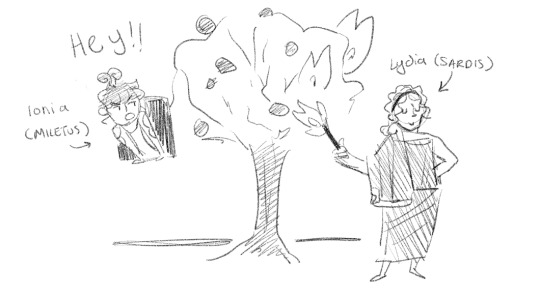
This went on for 11 years and Miletus didn’t receive help from any of the other Ionian Greeks (save for one bit they’d helped out earlier in a different war).
In the twelfth year, the Lydians accidentally burnt down a temple to Athena of Assesos when the wind caused fire to spread from the crops they were trying to burn. Mysteriously, the King of Lydia (Alyattes) came down with an illness.
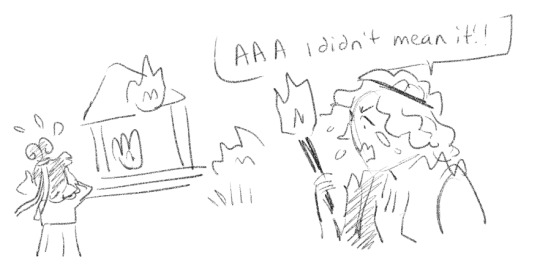
So off goes Lydia to the Oracle at Delphi which is where most people go to solve Mysteriously Coincidental Monarchical Maladies and the Oracle cleverly suggests Maybe You Should Rebuild That Temple You Burnt By Accident.

The Lydians get set to go ask the Milesians nicely if they are ok with not being sieged this year while they make reparations, they only wanted to starve them a little after all and they’re sure once this temple is fixed that they can go back to destroying their crops again!
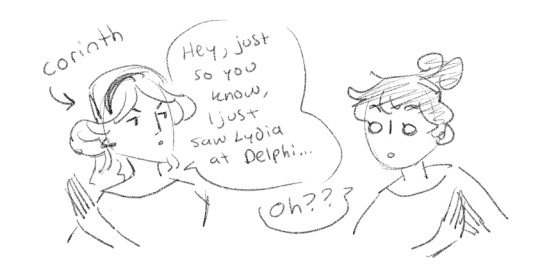
The Milesians, hearing that the Lydians are on their way, quickly gather up every scrap of food they have and pile it up in the middle of town right where the Lydians are going to be marching through...


The Milesians threw a huge party with tons of food and drink and dancing, just like they totally, honestly, really seriously do all the time even when the Lydians have been setting fire to all their food.
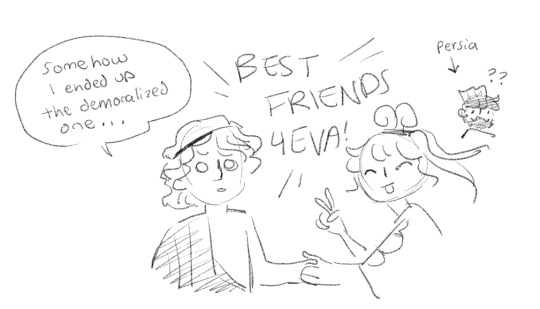
And thus the Lydians and the Milesians set aside their differences and became friends and allies (until Persia noticed how shiny Lydia was anyway).
Bonus:
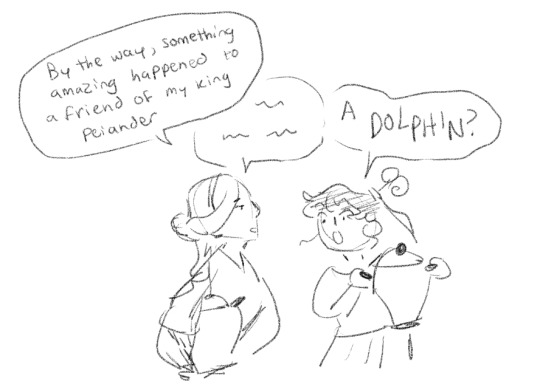
#hapo reads herodotus#hapo reads greek lit#ancientalia#aph ionia#aph miletus#aph lydia#aph corinth#hapo doodles#athens and sparta adventures#digital art#clip studio paint#aph persia#aasa persia
32 notes
·
View notes
Photo

Athens and Sparta Adventures: Chapter 8: Book of Ships pg. 8
[previous] [contents] [next]
Quick Ref:
Achaemenid Languages: One of the major successes of the Persian Empire was adopting Aramaic as a common language to communicate across the vast territories under their control. Greek would also have had some significance in the empire as several Greek territories were under Persian control and Greek speaking people would have also have been employed in administrative roles. Herodotus also claims to have consulted Persian historians, so we can imagine there was some mutual interest in cultural exchange.
Comments:
Quatsch massively improved this page by suggesting to not completely forget about Hali and Sardis and have them come along :’ )
Persia: what failure? :) i like to think i successfully absorbed the good bits and actually it’s advantageous for me to ignore the rocky desolate annoying parts.
#athens and sparta adventures#historical hetalia#ancientalia#aasa ionia#aasa miletus#aasa persia#aasa halicarnassus#aasa lydia#aasa sardis#digital art#clip studio paint#hapo art#aasacomic#aasachp8
23 notes
·
View notes
Text
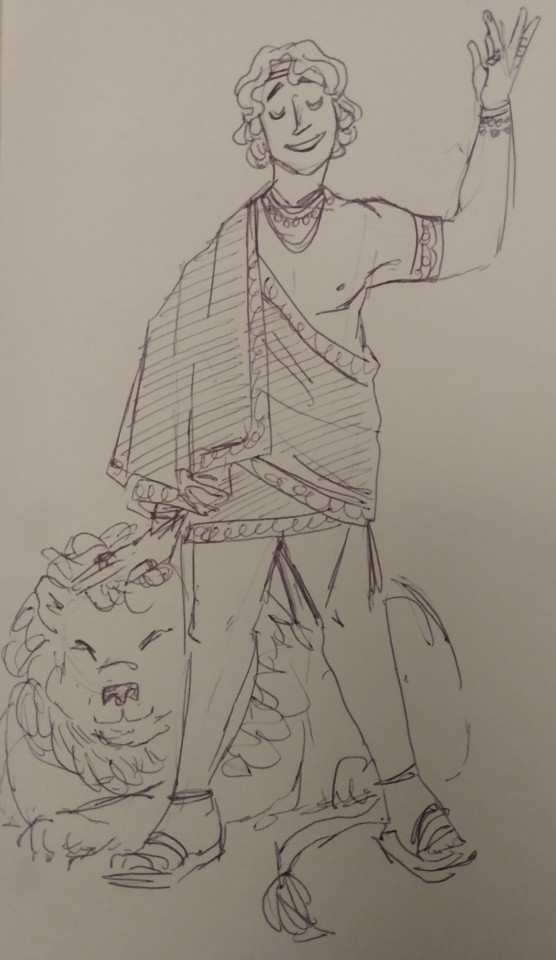
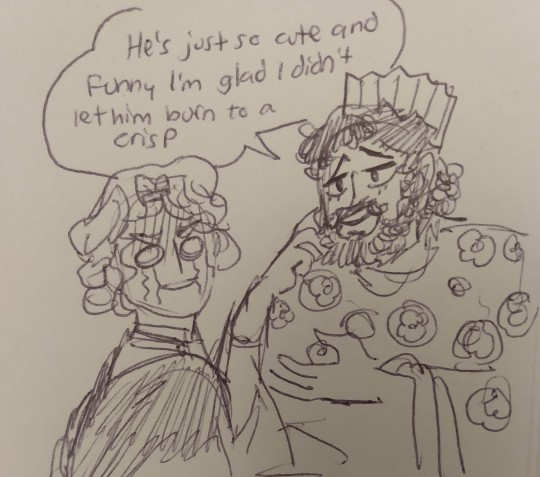
I didn't really leave room in the main storyline of AaSA to put Sardis (Lydia) on display - especially since he's been humbled since immediately getting put in his place in chapter 1. Wanted to doodle him as he would have been because why not
(Persia keeps him around because no matter what Sardis says or does somehow he ended up as Persia's silly rabbit)
20 notes
·
View notes
Photo
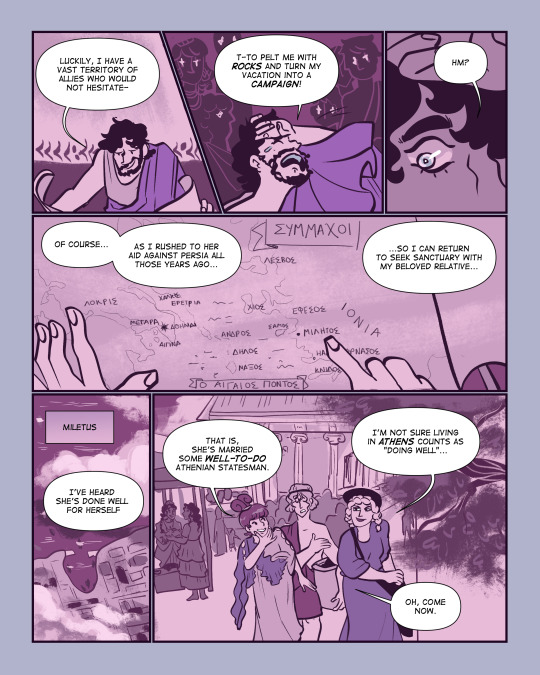
Athens and Sparta Adventures: Chapter 8: Book of Ships pg. 2
[previous] [contents] [next]
Quick Ref:
Delian League: Although not known as such to its contemporaries, the league was made up of the city-states and various islands bullied into paying tribute to the Athenian navy in exchange for military defence.
Miletus: A Greek city-state on the west coast of Anatolia (now Turkey) and one of the major centres of Ionia. I have retroactively associated my personification of Ionia with this city in particular.
Comments:
I do think Athens is self-aware enough to realize that he is in fact deeply disliked by his “allies” and his despotism is rooted in the knowledge that he is still a scrawny little rat man that would normally have his ass handed to him in a land-based battle...
And no we don’t know what exactly he’s running from, not yet :3
Ionia is currently free from Persian control, but I feel like she probably still has close ties with those who are still in the empire. Here she is talking to Lydia (Sardis) and introducing for the first time and representing the region of Caria: Halicarnassus! (who is also listed as a Delian League member because I can’t remember for the life of me when they joined). Halicarnassus’ design is inspired by a real ancient personification mosaic from the Late Roman period which you can see in the British Museum and provided to me by @en-theos hehe
They are gossiping about a Real Historical Figure :)
#athens and sparta adventures#aph athens#aasa athens#aasa ionia#aasa miletus#aasa sardis#aasa lydia#aasa halicarnassus#oh background characters??? whomst#aasachp8#aasacomic
23 notes
·
View notes
Photo
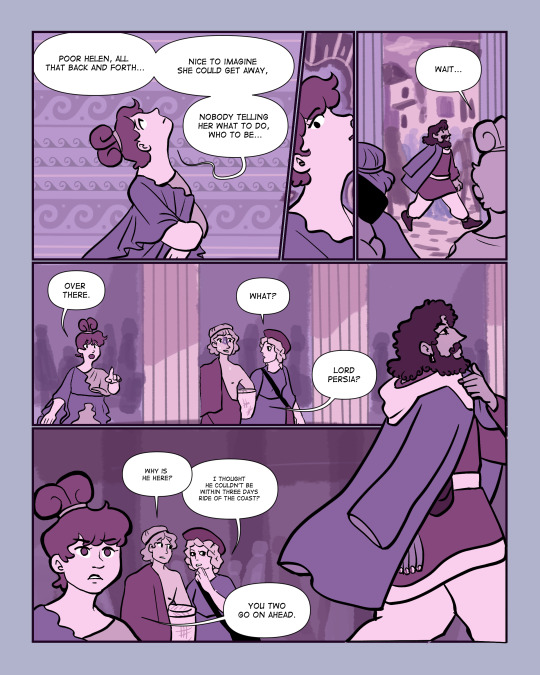
Athens and Sparta Adventures: Chapter 8: Book of Ships pg. 4
[previous] [contents] [next]
Quick Ref:
Helen of Troy: Or perhaps equally appropriately, Helen of Sparta, the most beautiful woman in the world promised by the Greeks to Menelaus of Sparta and also promised by the goddess Aphrodite to Paris, prince of Troy. Helen was not the first woman of legend to be abducted across the Aegean between Greece and Asia, but she is certainly the most famous.
Peace of Callias: The supposed treaty between Athens and Persia, though it is debatable whether it was even real. The terms specified the Persians would have to vacate Ionia within three days ride, but I don’t think Persia particularly cares about treaties with minor backwater city-states even if they are a pain in the neck.
Comments:
I drew Persia in more lightweight Median style clothing today because rather than dressing up for a big theatrical event he’s travelling a little light for some reason. This outfit was probably more appropriate for horseback riding as well.
#athens and sparta adventures#ancientalia#aph oc#hws oc#aasa persia#aasa ionia#aasa miletus#aasa lydia#aasa sardis#aasa halicarnassus#clip studio paint#hapo art#digital art#aasachp8
18 notes
·
View notes
Text
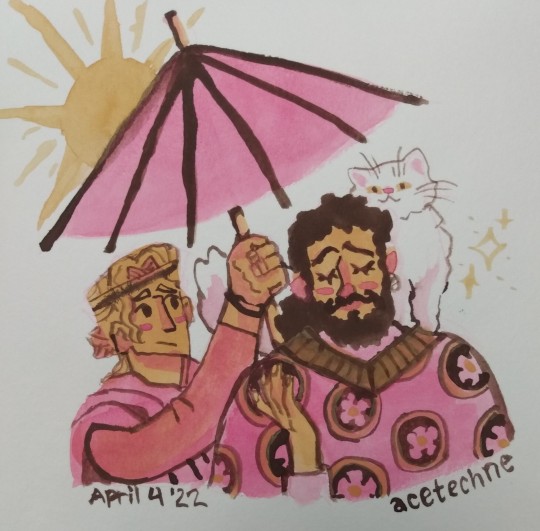
Using up leftover paint
#athens and sparta adventures#aasa art#traditional art#aasa Persia#aasa sardis#aasa lydia#hapo art#gouache
18 notes
·
View notes
Photo
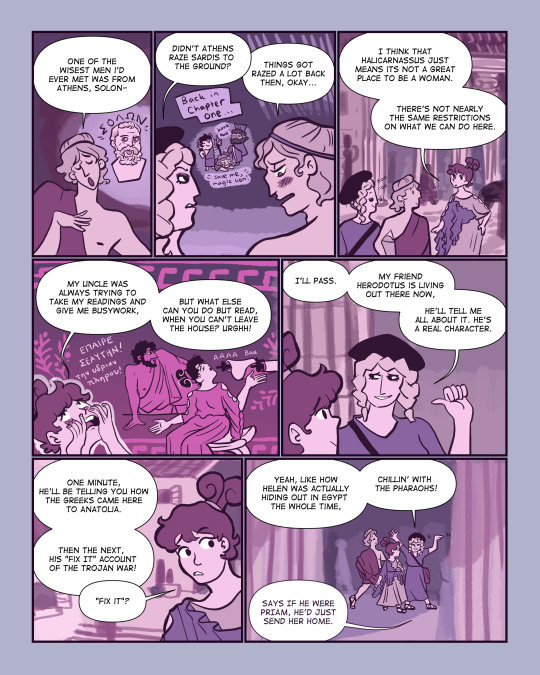
Athens and Sparta Adventures: Chapter 8: Book of Ships pg. 3
[previous] [contents] [next]
Quick Ref:
Solon: Athenian statesman from the 6th century BCE credited with laying the foundations for Athenian democracy. He was said to have advised King Croesus of Lydia with the words “Count no man happy until he is dead” shortly before the Lydian empire was conquered by Persia.
Sardis: The capital of Lydia, famous for metallurgy and creating coinage. Lydia became a province of the Persian Empire in Chapter 1 and would remain so until its conquest by Alexander the Great. It was also the terminus of the Persian Royal Road from Susa
Halicarnassus: A city in Caria south of Ionia that retained a monarchical system long after other Greek city-states and remained loyal to the Persian Empire after the Ionian revolt. The city was most famous for being the hometown of the “Father of History” Herodotus, Queen Artemisia who led Persian forces at the Battle of Salamis, and the Tomb of Mausolus, one of the wonders of the ancient world.
Comments:
I know that both Sardis and Halicarnassus are still loyal to Persia in this era, but I wanted to give Ionia/Miletus someone to talk to and I assumed they would still be able to spend some time with each other, probably more than she would with the mainland Greeks.
Sardis (Lydia) was so described as “theatre twink” by Quatsch when she beta-read this page and that’s not wrong. I tend to base his personality off of Herodotus’ assessment of Croesus, an overconfident rich kid who became the special pet of the Persian king Cyrus.
This is textbook ancient Greek since mine is so rusty, in panel 1 it just reads “SOLON” and in panel 4 it reads “GET UP! (lit. “raise yourself!) Fill the hydria (water jar).” and “‘AAAA’ she shouts”
All of these references to Herodotus refer to Book I of Histories. Always remember to exercise the old critical thinking muscles when engaging with Herodotus. Do Not Make Direct Eye Contact with Herodotus and do Not Feed the Herodotus lest he try to convince you of his absolute knowledge of cultures he had a tangential knowledge of. Herodotus is not to be confused with modern historians or your high school history teacher. This message brought to you by Experiences with People Who Take Herodotus Way Too Seriously.
(That said, the following links are to comics I drew earlier about Herodotus)
The Conflict Between Greece and Asia 1.1-7
How Ionia and Lydia became BFFS 1.15-22
Solon’s Wisdom 1.30-2
#athens and sparta adventures#ancientalia#aph athens#aph sparta#aasa ionia#aasa miletus#aasa halicarnassus#aasa lydia#aasa sardis#digital art#clip studio paint#hapo art#aasachp8#aasa
18 notes
·
View notes
Text
Musing about chapter 1 of AaSA and thinking about how if I had actually done my readings for class I might have structured it more the way that Herodotus does - Croesus (and Lydia) playing a more central role in introducing the characters. Maybe this would be more a prologue/chapter zero in effect because chapter 1 opens with the conquering of Lydia.
Herodotus in his fun little tangents describes how Croesus is directed by the Oracle at Delphi to seek out the strongest of all the Greeks, narrowing it down to the descendants of the Ionians (Athens) and the Dorians (Sparta) and goes into some detail describing the recent political history of both city-states.
(also I love how Herodotus calls Sparta the worst governed of all the Greeks who had “little intercourse with each other or with strangers” before Lycurgus introduced his laws for the better and ... are you saying the Spartans ARE interacting with other human beings in contemporary times Herodotus??)
I guess I ended up addressing both of these character origin stories in Chapter 7 but still, framing it with Lydia might have been interesting even though Lydia was designed as a more throwaway character due to not having long lasting presence in the narrative. I’m just thinking “what if”.
0 notes